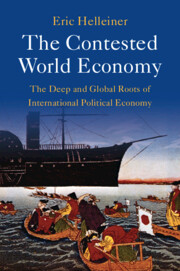Book contents
- The Contested World Economy
- The Contested World Economy
- Copyright page
- Dedication
- Contents
- Preface
- Abbreviations
- 1 Introduction and Overview
- Part I The Three Orthodoxies in a Global Context
- Part II Beyond the Three Orthodoxies
- 8 Autarkic Visions of Economic Self-Sufficiency
- 9 Environmentalist Calls for a More Sustainable Economic Order
- 10 Feminist Critiques of a Patriarchal World Economy
- 11 Pan-African Responses to a Racialized World Economy
- 12 Religious and Civilizational Political Economies of Pan-Islamism and Pan-Asianism
- 13 Distinctive Visions of Economic Regionalism for East Asia, Europe, and the Americas
- Part III Ending at a Beginning
- Works Cited
- Index
10 - Feminist Critiques of a Patriarchal World Economy
from Part II - Beyond the Three Orthodoxies
Published online by Cambridge University Press: 20 April 2023
- The Contested World Economy
- The Contested World Economy
- Copyright page
- Dedication
- Contents
- Preface
- Abbreviations
- 1 Introduction and Overview
- Part I The Three Orthodoxies in a Global Context
- Part II Beyond the Three Orthodoxies
- 8 Autarkic Visions of Economic Self-Sufficiency
- 9 Environmentalist Calls for a More Sustainable Economic Order
- 10 Feminist Critiques of a Patriarchal World Economy
- 11 Pan-African Responses to a Racialized World Economy
- 12 Religious and Civilizational Political Economies of Pan-Islamism and Pan-Asianism
- 13 Distinctive Visions of Economic Regionalism for East Asia, Europe, and the Americas
- Part III Ending at a Beginning
- Works Cited
- Index
Summary
Feminism is often portrayed as a relatively new perspective in debates about the international dimensions of political economy, but it has predecessors in ideas advanced by some prominent thinkers in the pre-1945 era. These thinkers shared– with varying levels of commitment – a broad normative goal which has echoes in contemporary feminist IPE literature: that of challenging patriarchal practices and structures in order to end women’s subordination within the world economy. There were many divisions among these thinkers, including between those who sought to promote feminist goals within an economic liberal framework (including Jane Addams, Bertha Lutz, Chrystal Macmillan, Harriet Martineau) and those more drawn to socialism and Marxism (Williama Burroughs, Kamaladevi Chattopadhyaya, Aleksandra Kollontai, Paulina Luisi, Magda Portal, Clara Zetkin). Some other thinkers also linked feminist goals to other perspectives such as neomercantilism (once again, Henry Carey), Pan-Africanism (Amy Ashwood Garvey), and anarchism (He-Yin Zhen).
Keywords
- Type
- Chapter
- Information
- The Contested World EconomyThe Deep and Global Roots of International Political Economy, pp. 164 - 186Publisher: Cambridge University PressPrint publication year: 2023

